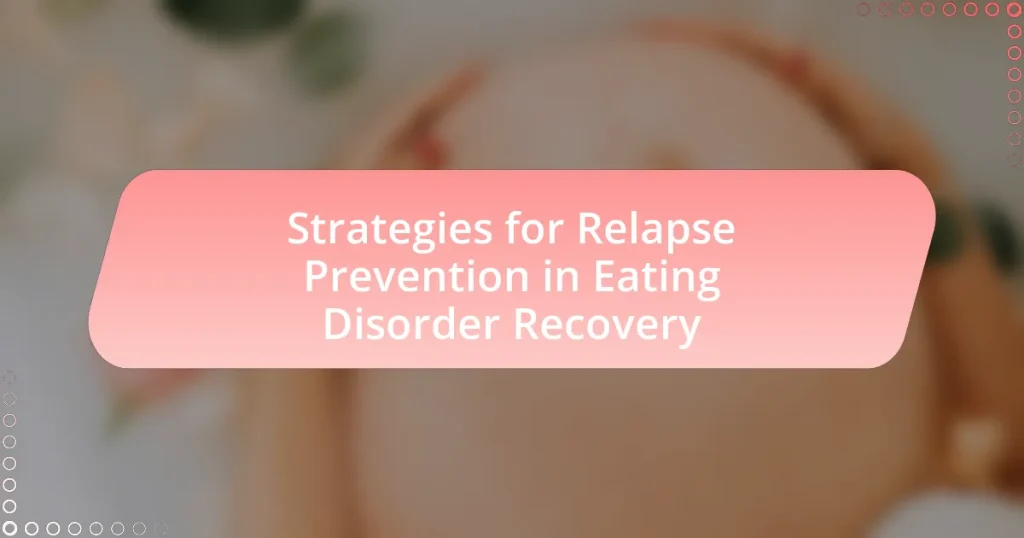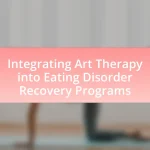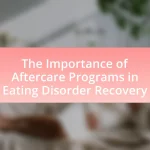The article focuses on strategies for relapse prevention in eating disorder recovery, emphasizing the importance of a strong support system, self-monitoring, and effective coping skills. Key strategies include therapy, mindfulness practices, and nutrition education, which collectively enhance emotional regulation and reduce relapse triggers. The article also highlights common relapse triggers, the role of professional support, and practical tips for maintaining recovery, such as establishing routines and journaling. Research findings underscore the effectiveness of these strategies in promoting long-term recovery and reducing relapse rates among individuals with eating disorders.
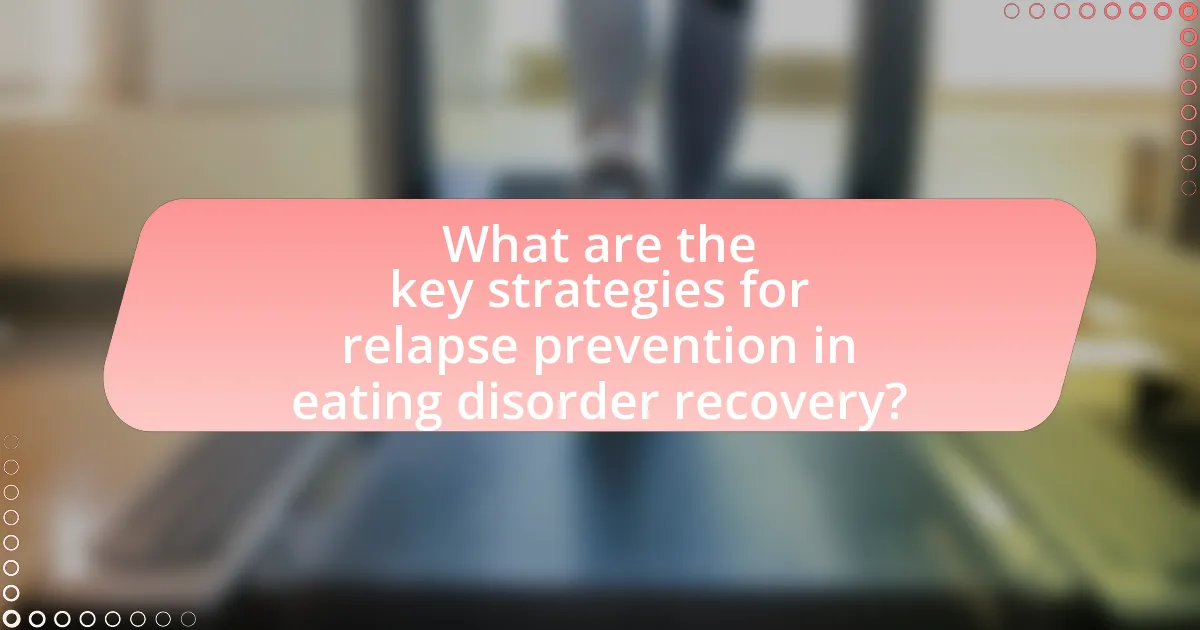
What are the key strategies for relapse prevention in eating disorder recovery?
Key strategies for relapse prevention in eating disorder recovery include developing a strong support system, practicing self-monitoring, and utilizing coping skills. A strong support system, which may consist of family, friends, and healthcare professionals, provides emotional and practical assistance, reducing feelings of isolation. Self-monitoring involves tracking thoughts, feelings, and behaviors related to eating, which helps individuals identify triggers and patterns that may lead to relapse. Additionally, utilizing coping skills, such as mindfulness, stress management techniques, and healthy communication, equips individuals with tools to manage challenges effectively. Research indicates that these strategies significantly contribute to sustained recovery and lower relapse rates in individuals with eating disorders.
How do these strategies support long-term recovery?
Strategies for relapse prevention in eating disorder recovery support long-term recovery by providing individuals with tools and coping mechanisms to manage triggers and stressors effectively. These strategies, such as cognitive-behavioral techniques, mindfulness practices, and support group participation, help individuals develop a greater awareness of their thoughts and behaviors, enabling them to identify and address potential relapse triggers. Research indicates that individuals who engage in structured relapse prevention strategies are less likely to experience relapse, with studies showing a 50% reduction in relapse rates among those who actively utilize these techniques compared to those who do not.
What role does therapy play in these strategies?
Therapy plays a crucial role in strategies for relapse prevention in eating disorder recovery by providing structured support and coping mechanisms. It helps individuals identify triggers, develop healthier thought patterns, and establish effective coping strategies to manage cravings and emotional distress. Research indicates that cognitive-behavioral therapy (CBT) significantly reduces relapse rates by addressing the underlying cognitive distortions associated with eating disorders, as evidenced by a study published in the Journal of Consulting and Clinical Psychology, which found that CBT led to sustained improvements in eating behaviors and psychological well-being.
How can support groups enhance relapse prevention efforts?
Support groups enhance relapse prevention efforts by providing a network of emotional support and accountability among individuals facing similar challenges. This communal environment fosters open communication, allowing members to share experiences, coping strategies, and encouragement, which can significantly reduce feelings of isolation often associated with eating disorders. Research indicates that participation in support groups can lead to improved recovery outcomes; for instance, a study published in the Journal of Eating Disorders found that individuals who engaged in group therapy reported lower rates of relapse compared to those who did not participate in such groups. This evidence underscores the effectiveness of support groups in reinforcing commitment to recovery and promoting resilience against relapse triggers.
What are the common triggers for relapse in eating disorder recovery?
Common triggers for relapse in eating disorder recovery include stress, negative body image, and social situations involving food. Stress can lead individuals to revert to disordered eating behaviors as a coping mechanism. Negative body image often exacerbates feelings of inadequacy, prompting a return to unhealthy eating patterns. Additionally, social situations that involve food can create anxiety and temptation, increasing the risk of relapse. Research indicates that approximately 50% of individuals with eating disorders experience relapse, highlighting the importance of recognizing these triggers for effective prevention strategies.
How can individuals identify their personal triggers?
Individuals can identify their personal triggers by maintaining a detailed journal that records their thoughts, feelings, and behaviors related to eating. This practice allows individuals to recognize patterns and specific situations that lead to cravings or unhealthy behaviors. Research indicates that self-monitoring through journaling can enhance awareness of emotional and environmental cues, which are critical in understanding triggers. For instance, a study published in the Journal of Eating Disorders found that individuals who tracked their eating habits and emotional states were better able to identify their triggers, leading to more effective coping strategies.
What coping mechanisms can be developed to manage these triggers?
Coping mechanisms that can be developed to manage triggers in eating disorder recovery include mindfulness practices, cognitive restructuring, and establishing a support network. Mindfulness practices, such as meditation and deep breathing, help individuals stay present and reduce anxiety associated with triggers. Cognitive restructuring involves identifying and challenging negative thought patterns that contribute to disordered eating behaviors, promoting healthier perspectives. Establishing a support network, including friends, family, or support groups, provides emotional support and accountability, which are crucial for managing triggers effectively. Research indicates that these strategies can significantly reduce the risk of relapse in individuals recovering from eating disorders, as they foster resilience and coping skills essential for long-term recovery.
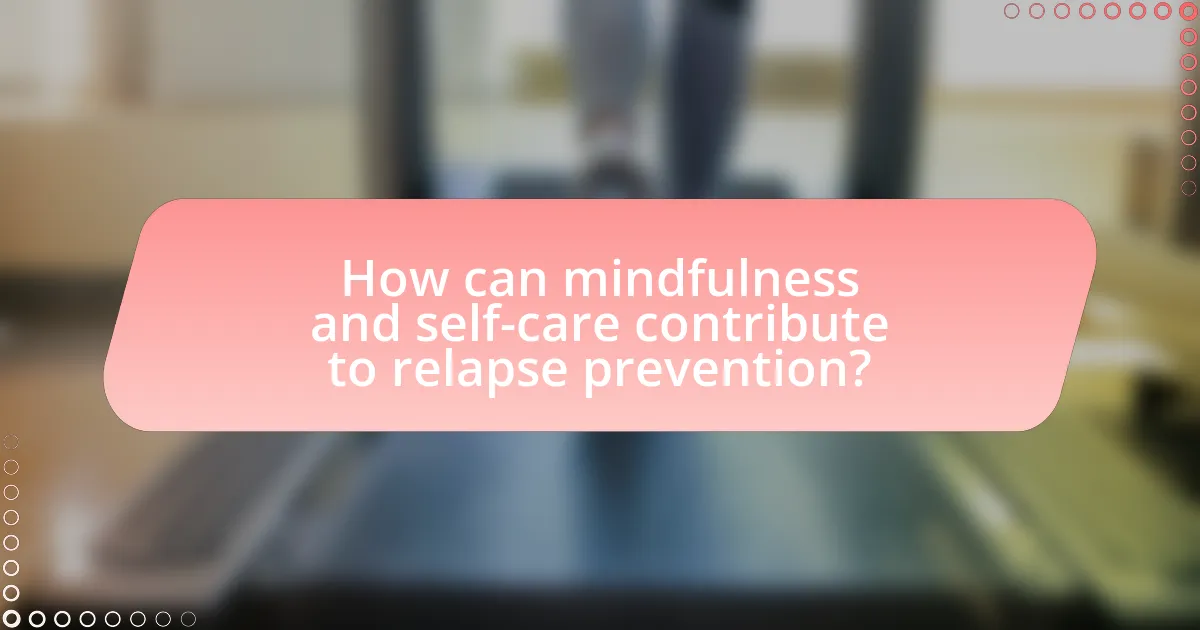
How can mindfulness and self-care contribute to relapse prevention?
Mindfulness and self-care significantly contribute to relapse prevention by enhancing emotional regulation and reducing stress. Mindfulness practices, such as meditation and deep breathing, help individuals become more aware of their thoughts and feelings, allowing them to identify triggers that may lead to relapse. Research indicates that mindfulness can decrease symptoms of anxiety and depression, which are often precursors to relapse in eating disorders. A study published in the Journal of Eating Disorders found that participants who engaged in mindfulness-based interventions reported lower rates of relapse compared to those who did not. Additionally, self-care activities, such as maintaining a balanced diet, regular exercise, and adequate sleep, support overall well-being and resilience, further decreasing the likelihood of relapse. By fostering a positive self-image and promoting healthy coping strategies, mindfulness and self-care create a robust framework for sustaining recovery from eating disorders.
What mindfulness techniques are effective in eating disorder recovery?
Mindfulness techniques effective in eating disorder recovery include mindful eating, body scan meditation, and breath awareness. Mindful eating encourages individuals to focus on the sensory experience of eating, which can help reduce binge eating and promote a healthier relationship with food. Body scan meditation allows individuals to develop awareness of physical sensations and emotions, fostering acceptance and reducing anxiety related to body image. Breath awareness techniques help individuals manage stress and emotional triggers, which are often linked to disordered eating behaviors. Research indicates that these mindfulness practices can significantly improve emotional regulation and reduce symptoms of eating disorders, as evidenced by studies published in journals such as the Journal of Eating Disorders.
How does mindfulness help in recognizing unhealthy thoughts?
Mindfulness helps in recognizing unhealthy thoughts by promoting awareness of the present moment and fostering non-judgmental observation of thoughts and feelings. This practice allows individuals to identify negative thought patterns related to eating disorders, such as self-criticism or distorted body image, without becoming overwhelmed by them. Research indicates that mindfulness-based interventions can significantly reduce symptoms of anxiety and depression, which are often linked to unhealthy thought processes in eating disorder recovery. For example, a study published in the journal “Eating Disorders” by Kristeller and Johnson found that mindfulness training improved participants’ ability to recognize and respond to unhealthy thoughts, leading to better emotional regulation and reduced relapse rates.
What self-care practices can support emotional well-being?
Self-care practices that support emotional well-being include mindfulness meditation, regular physical activity, and maintaining a balanced diet. Mindfulness meditation has been shown to reduce anxiety and improve emotional regulation, as evidenced by a study published in the journal “Psychological Science,” which found that participants who practiced mindfulness reported lower levels of stress. Regular physical activity, such as aerobic exercise, is linked to the release of endorphins, which enhance mood and reduce feelings of depression, according to research from the American Psychological Association. Additionally, a balanced diet rich in nutrients can positively influence mood and cognitive function, as highlighted in a study from the journal “Nutritional Neuroscience,” which found that diets high in fruits, vegetables, and omega-3 fatty acids are associated with lower rates of depression.
How can nutrition education aid in preventing relapse?
Nutrition education can aid in preventing relapse by equipping individuals with the knowledge and skills necessary to make informed dietary choices. This education helps individuals understand the importance of balanced nutrition, which can stabilize mood and reduce cravings associated with eating disorders. Research indicates that individuals who receive nutrition education are more likely to adhere to healthy eating patterns, thereby decreasing the likelihood of relapse. For instance, a study published in the Journal of Eating Disorders found that participants who engaged in structured nutrition education reported improved dietary habits and a lower incidence of relapse compared to those who did not receive such education.
What are the essential components of a balanced diet for recovery?
A balanced diet for recovery includes carbohydrates, proteins, healthy fats, vitamins, and minerals. Carbohydrates provide energy, essential for physical and mental recovery, while proteins are crucial for tissue repair and muscle recovery. Healthy fats support brain health and hormone production, which are vital during recovery. Vitamins and minerals, found in fruits and vegetables, play a key role in overall health and immune function. Research indicates that a well-rounded diet can significantly improve recovery outcomes in individuals with eating disorders, as it helps restore nutritional balance and supports psychological well-being.
How can meal planning reduce anxiety around food?
Meal planning can reduce anxiety around food by providing structure and predictability in dietary choices. This structured approach allows individuals to anticipate meals, reducing uncertainty and the stress associated with spontaneous food decisions. Research indicates that having a meal plan can lead to improved dietary adherence and reduced feelings of overwhelm, as it eliminates the need for on-the-spot decision-making, which can trigger anxiety in those recovering from eating disorders. A study published in the Journal of Eating Disorders found that individuals who engaged in meal planning reported lower levels of food-related anxiety and greater satisfaction with their eating habits.
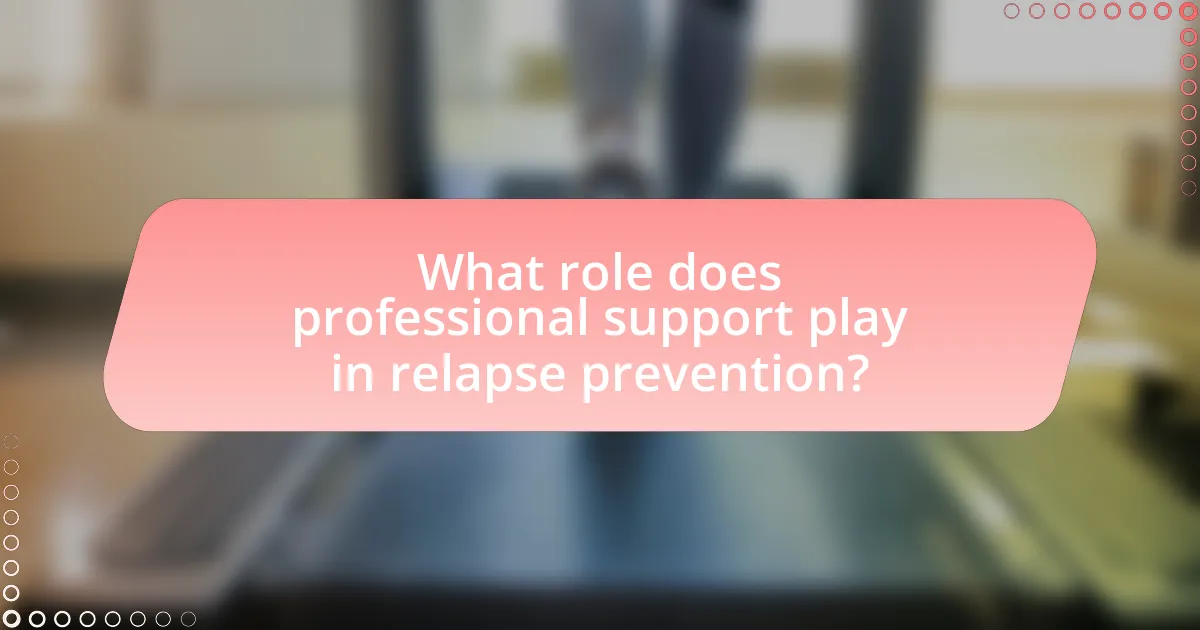
What role does professional support play in relapse prevention?
Professional support plays a crucial role in relapse prevention by providing individuals with the necessary tools, guidance, and accountability to maintain recovery from eating disorders. This support often includes therapy, nutritional counseling, and medical supervision, which collectively address the psychological, emotional, and physical aspects of recovery. Research indicates that individuals who engage with mental health professionals and support groups are significantly less likely to relapse, as these resources foster coping strategies and resilience. For instance, a study published in the Journal of Eating Disorders found that ongoing therapy and support significantly reduced relapse rates among individuals recovering from anorexia and bulimia. Thus, professional support is integral to sustaining recovery and preventing relapse in eating disorder treatment.
How can therapists tailor strategies for individual needs?
Therapists can tailor strategies for individual needs by conducting thorough assessments to understand each client’s unique circumstances, triggers, and goals. This personalized approach allows therapists to select and adapt evidence-based interventions, such as cognitive-behavioral therapy or mindfulness techniques, that align with the client’s specific challenges and preferences. Research indicates that individualized treatment plans significantly enhance engagement and effectiveness, as evidenced by a study published in the Journal of Eating Disorders, which found that personalized strategies improved recovery outcomes in patients with eating disorders.
What types of therapy are most effective for eating disorders?
Cognitive Behavioral Therapy (CBT) and Family-Based Therapy (FBT) are the most effective types of therapy for eating disorders. CBT focuses on changing negative thought patterns and behaviors associated with eating disorders, demonstrating efficacy in numerous studies, including a meta-analysis published in the Journal of Eating Disorders, which found that CBT significantly reduces symptoms of anorexia and bulimia. FBT, particularly effective for adolescents with anorexia, involves the family in the treatment process, promoting healthier eating behaviors and family dynamics, as evidenced by research published in the American Journal of Psychiatry, which showed improved outcomes for adolescents undergoing FBT compared to individual therapy.
How can dietitians contribute to a comprehensive recovery plan?
Dietitians can significantly contribute to a comprehensive recovery plan by providing tailored nutritional guidance that addresses the specific needs of individuals recovering from eating disorders. They assess dietary habits, educate clients on balanced nutrition, and develop meal plans that promote physical health and psychological well-being. Research indicates that proper nutrition is crucial for restoring metabolic balance and improving mood, which are essential for recovery. For instance, a study published in the “International Journal of Eating Disorders” highlights that nutritional rehabilitation can lead to improved outcomes in individuals with anorexia nervosa. By integrating dietary strategies into the recovery process, dietitians help individuals build a healthier relationship with food, thereby reducing the risk of relapse.
What are the signs of potential relapse to watch for?
Signs of potential relapse in eating disorder recovery include changes in eating habits, increased secrecy around food, withdrawal from social activities, and heightened emotional distress. These indicators suggest a shift in behavior that may precede a relapse. For instance, research indicates that individuals may begin to restrict food intake or engage in binge-eating episodes as a response to stress or emotional triggers, which can signal a return to disordered eating patterns. Monitoring these signs is crucial for early intervention and support.
How can individuals monitor their mental and emotional states?
Individuals can monitor their mental and emotional states by utilizing self-assessment tools such as mood journals, mindfulness practices, and standardized questionnaires like the Beck Depression Inventory. These methods allow individuals to track their feelings and thoughts over time, providing insights into patterns and triggers. Research indicates that regular self-monitoring can enhance self-awareness and emotional regulation, which are crucial for maintaining recovery from eating disorders. For instance, a study published in the Journal of Eating Disorders found that participants who engaged in daily mood tracking reported improved emotional awareness and reduced relapse rates.
What proactive steps can be taken when warning signs appear?
When warning signs of relapse in eating disorder recovery appear, individuals should immediately engage in open communication with their support network, including therapists and loved ones. This proactive step allows for timely intervention and support, which is crucial in addressing the underlying issues before they escalate. Research indicates that early detection and intervention can significantly reduce the risk of full relapse, as highlighted in a study published in the Journal of Eating Disorders, which found that individuals who sought help upon noticing warning signs had a 50% lower chance of experiencing a relapse compared to those who did not. Additionally, implementing coping strategies such as mindfulness practices, journaling, and regular self-assessment can help individuals manage their emotions and thoughts effectively, further reinforcing their commitment to recovery.
What practical tips can enhance relapse prevention efforts?
Practical tips that can enhance relapse prevention efforts include establishing a strong support network, developing coping strategies, and maintaining a structured routine. A strong support network, consisting of friends, family, and professionals, provides emotional and practical assistance, which is crucial for recovery. Research indicates that social support significantly reduces the risk of relapse in individuals recovering from eating disorders. Developing coping strategies, such as mindfulness and stress management techniques, equips individuals with tools to handle triggers effectively. Studies show that individuals who practice mindfulness report lower levels of anxiety and a reduced likelihood of relapse. Lastly, maintaining a structured routine helps individuals create stability and predictability in their daily lives, which can mitigate feelings of chaos that often lead to relapse.
How can establishing a routine support recovery?
Establishing a routine can significantly support recovery by providing structure and predictability, which are essential for individuals overcoming eating disorders. A consistent daily schedule helps to reduce anxiety and uncertainty, allowing individuals to focus on their recovery goals. Research indicates that routines can enhance emotional regulation and promote healthier eating patterns, as they encourage regular meal times and self-care practices. For instance, a study published in the Journal of Eating Disorders found that participants who adhered to structured meal plans experienced improved outcomes in their recovery journey. This evidence underscores the importance of routine in fostering a supportive environment for healing and relapse prevention.
What role does journaling play in maintaining awareness and accountability?
Journaling plays a crucial role in maintaining awareness and accountability in the context of eating disorder recovery. It serves as a reflective practice that allows individuals to track their thoughts, emotions, and behaviors related to food and body image. By documenting daily experiences, individuals can identify patterns and triggers that may lead to relapse, thereby enhancing self-awareness.
Research indicates that journaling can improve emotional regulation and self-reflection, which are essential for accountability in recovery. A study published in the Journal of Clinical Psychology found that expressive writing significantly reduced symptoms of eating disorders by fostering insight and self-monitoring. This process of writing not only helps individuals articulate their struggles but also reinforces commitment to recovery goals, making them more accountable for their actions.
